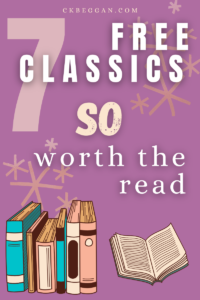
Most of us have a lot of unexpected time on our hands at the moment (please stay healthy out there, everyone). A lot of us are have time for all these things we’d always wanted to do but now lack the budget. (Ahem. My new Social Isolation comic is also free. Read it in good health.) So here are some public domain books available for free (note: I say it like that because not all copies are free. Some get gussied up with fresh covers and forwards and the like, as opposed to the free digital copies you can find in the Amazon kindle store, Project Gutenberg, etc.).
In a nutshell, these are all books that I have read and that I thought added value to my days. And were free.
- Peter and Wendy, J.M. Barrie. Kind of a spoiler (but not an important one): Did you know Peter completely forgets Tinker Bell ever existed? Yup, this is not the Disney version you know, or even the one you glimpsed in movies like Finding Neverland. Peter isn’t just the eternal child, he’s the ultimate child, with all the strengths and weaknesses that includes. A wonderful read that is sometimes shockingly different from the story I thought I knew.
- The Phantom of the Opera, Gaston Leroux. Another great read, with aspects not found in any production I’ve seen (the musical, the Claude Rains version of the movie, the old soundless version…I’m quite the Phantom fan). It is, of course, violent. But if you still feel the sympathy for the phantom that the musical offered, that just shows how masterfully it’s written. It’s more twisted (and inevitably darker) than any version of the story you may know.
- Anything Jane Austen, Jane Austen. Okay, I haven’t read ALL her works. But I have Northanger Abbey on my Kindle, and Pride and Prejudice is one of my favorite books. Jane Austen is always worth a revisit or a first look. Of the ones I’ve read, however, Pride and Prejudice is by far the funniest (but still romantic, even if you aren’t picturing a young Colin Firth as Mr. Darcy).
- A Room with a View, E.M. Forster. Wow, did Forster ever write great female characters, by which I mean fair, realistic and interesting portrayals. Howards End (possibly the more famous book) is on my personal wish list, but this one I’ve both read and enjoyed. I can’t say enough good things about PBS’s recent adaptation of Howards End, which also made me recall this book fondly, so here we are. Is something wrong with me? Probably too much Chopin.
- Henry V, William Shakespeare. War! Redemption! Grief! Courage! Surprisingly tender romantic overtures at the very end! French lords whose names you recognize from wine! Well, what are you waiting for?
- Wuthering Heights, Emily Bronte. I first read this in high school as a pick of a reading list. A classmate who’d already tackled it gave me some of the best reading advice I’ve ever heard: “It’s slow at the beginning, but keep going and it gets REALLY good.” Slow was an understatement (one might say boring), but then all the sudden the story truly started and I was engrossed. This book is now one of my all-time favorites, and might be the book I’ve read the most times.
- Tao te Ching, credited to Lao Tzu (various translations). If you haven’t read it yet, then why not? I picked this up at a time when I was beginning a period of self-reflection and in very need of a little macro view on life, the universe and everything. It brought me a bit of peace, it brought me a bit of a new perspective, and it brought me (you guessed it, just a bit) into a different type of thoughtfulness and awareness.
That’s not to say you need to have a somber or searching state of mind to read it. It’s not very long, but it can be contradictory, opaque, and some say it is best read in the language it was written in. Could the way I felt about it be the effect of reading something very different than what I was used to, that can feel a bit obscure so that my focus was on figuring out what something meant rather than, say, worrying about my dumb problems? Sure. Either way, it was great.
Note: It is possible to find versions of the Tao te Ching that rhyme (I have a hard copy like this), which means the text has been bent to accommodate English words, rather than finding the English words to accommodate the text. After reading a plainer translation, I found the rhyming kind of difficult to read and not as good an experience. But maybe you could use a jaunty rhyming scheme right about now, who knows?
There you have it!
Cheers and stay well,
-CKB